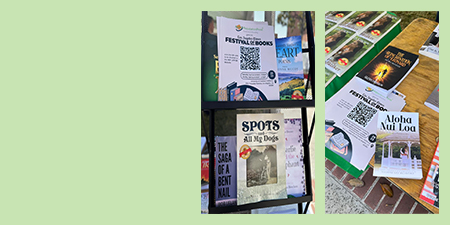Among the books displayed by ARPress at the Frankfurter Buchmesse in Frankfurt, Germany, from October 15 to 19, 2025, The Scrolls of Belbou by Dmitri Toul stood out quietly amid the buzz of the world’s largest publishing event. The fair, in its 77th edition, felt like a live pulse of the book-world: five days where ideas, culture, commerce, discovery and connection all collided in one place.
This year, the fair added several new layers of energy. For starters, the Guest of Honour was the Philippines, presenting under the theme “The imagination peoples the air.” That meant a special pavilion, a series of cultural and literary events highlighting Filipino voices and storytelling traditions.
Also, the fair leaned hard into cross-media formats: the newly emphasized “Book-to-Screen Day” on October 17 signalled that publishers and creatives are not just thinking print, but film, TV and streaming. For example, you could stroll from a rights negotiation meeting straight into a panel about turning a novel into a streaming series, then glance over to an audio zone where narrators and audiobook tech were on show.
The public programme (open to all from Friday onward) featured a dizzying range of stages: manga, comics, cosplay and games got serious space this year; there was a “Centre Stage” in Hall 4.1 for cultural and political talks (featuring big names like a Nobel Peace Prize laureate and ex-NATO Secretary General) and a “Reading Zone of Independent Publishers” where up-and-coming voices were amplified. Even the logistics showed how the fair is living up to its global claims: over 4,000 exhibitors from across the world, and the event framed as “the defining fair for the print and digital content business.”
The opening hours show the rhythm: trade visitors got access from 15-18 October, while the general public could join in on Friday, Saturday and Sunday. What this means in practical terms: imagine showing up early in the week for rights talks or author meet-ups; imagine a Saturday afternoon where the booths flood with families, manga fans in cosplay, readers browsing new titles, authors signing, coffee in hand. Meanwhile behind the scenes, deals are being made, translation contracts drawn up, creators from around the world comparing notes. The venue itself, Messe Frankfurt, becomes a micro-city of publishing, buzzing with voices, booths, panels, unexpected side-conversations in hallways.
For a book like The Scrolls of Belbou by Dmitri Toul, this is fertile ground. In a setting where major genre titles can dominate the spotlights, the special, quieter books still find their nook, but now with the benefit of tremendous visibility. The broader themes of fair, cross-media adaptation, international rights, younger reader engagement, creative-tech intersections, mean that even a book whose focus is more contemplative, or niche can ride the wave of attention simply by showing up in the right context.
In a world where shadows rise and kingdoms tremble, The Scrolls of Belbou emerges as a powerful tale of courage, destiny, and the battle between light and darkness. It is not merely a story of fantasy, but of faith, duty, and the timeless struggle within every heart — the call to rise when the world grows dim. Dmitri Toul weaves a world both ancient and alive, where prophecy and purpose intertwine, and where even the smallest voice may echo through the ages.
Author Dmitri Toul is 81 years old. He wrote this book many years ago to impress upon his young son the value of doing one’s duty no matter what the odds are nor the consequences of that duty. He feels that such values are good at any time in one’s life. But it is up to any person to decide whether that value is one to grasp.
The Scrolls of Belbou follows two boys — Prince Abrams and Andrew — whose lives are forever changed by the winds of war. As the island kingdom braces for conflict, they are hidden deep within the enchanted forest under the care of Anasha, the King’s wizard. But what begins as a quest for safety unfolds into a journey of transformation, as both must confront trials that will test their loyalty, bravery, and understanding of duty. Along the way, they discover the ancient scrolls — sacred writings that hold not only the fate of the kingdom but the secret of their own calling.
Through a tapestry of battles, prophecies, and encounters with forces both benevolent and dark, the story reveals that destiny often hides in humility. Prince Abrams must grow beyond the privileges of birth to become a servant-leader, while Andrew must learn that courage is not born of title, but of truth. Together, they uncover that heroism lies not in the sword alone, but in the heart willing to do what is right — even when the path is uncertain.
Beyond its thrilling narrative, The Scrolls of Belbou is a story of hope — the kind that persists through shadow and silence. Toul reminds us that destiny is not about grandeur but grace. Like Prince Abrams, we are all heirs to a promise; like Andrew, we are all called to a courage that serves. The message is clear: when faith meets action, even the smallest act of obedience can alter the course of history.
For readers who long for adventure that uplifts the spirit, this book offers more than entertainment — it offers inspiration. It is a story that whispers truth in every battle cry and redemption in every trial. As Abrams and Andrew grow into their calling, we are reminded that our own journeys, too, are shaped by choice, friendship, and faith.
This year’s Frankfurter Buchmesse felt alive with possibility. The cultural dimension (Philippines guest of honour), the expanded public access, the varied programming (from comics to film-industry panels), the global-rights stage, all of that created a backdrop where a book doesn’t just have to be good, it has to connect. And walking among the stalls, one could almost sense the collision of story and technology, tradition and innovation, local voices and global echo.
So, when someone notices The Scrolls of Belbou by Dmitri Toul in ARPress’s display, maybe on a table near the broader non-fiction section, maybe in a quiet corner of a genre bay, they’re not just seeing a book. They’re seeing it in a moment: a moment of publishing’s future meeting its roots; a story offered amid thousands of others, inviting a reader to pause, to pick it up, to ask “what might this one say to me?” And perhaps that is why books like this matter even more in a fair like this, because among the big lights and big deals, there’s still space for the voice that whispers rather than shouts, for the reader who wanders, for the author who offers something earnest.
Visit the ARPress official social media accounts for more updates.
- https://authorreputationpress.com/
- https://www.facebook.com/AuthorReputationPressLLC
- https://www.instagram.com/authorreputationpress/
- https://www.pinterest.com/arpressllcseo/
- https://x.com/ARPressLLC
- https://www.tiktok.com/@arpressllc
- https://www.youtube.com/@AUTHORREPUTATIONPRESSLLC





